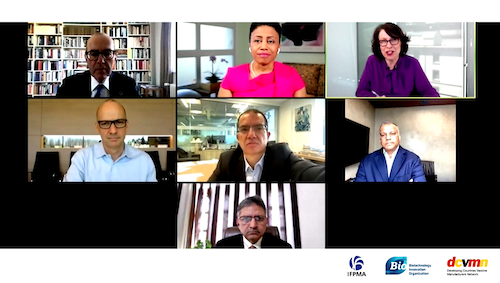
By Claire Doole, Doole Communications
Organising a virtual press briefing is to coin the Thai-English phrase – “same same but different.”
The basics are the same. You need to have news, which is impactful, timely and ideally topical. It may seem obvious, but too often press briefings are organised solely to “educate” the media about an issue. I can’t tell you how many I have left as a BBC Foreign Correspondent without a story to broadcast!
But there are many differences; while virtual briefings have many advantages notably cost, convenience, geographic reach and you could argue carbon footprint, as with all digital events they need to better prepared and moderated.
For the past year I have been moderating virtual media briefings for the International Federation of Pharmaceutical Manufacturers Associations on COVID 19 – last week was my 6th – and also advising companies and organisations on how to run and speak at them.
Preparing a virtual press briefing
Based on my experience on both sides of the fence as a moderator/media consultant/trainer and former journalist, here are four key questions you should ask yourself:
1. Hybrid or virtual? – Hybrid where the moderator and a key speaker(s) are together in a room has the advantage that you don’t lose your speakers due to technical glitches. However, you need audiovisual and logistical support. At the UN Palais in Geneva they also have some journalists in the room but as a moderator you need to make sure you don’t prioritise those in the room over those joining virtually.
2. Who do you invite? You can invite everyone on your media list or those outlets that are more strategically important for you. Make sure though that the links you send out are not shared as you don’t want to find yourself answering questions from government, corporate or NGO representatives. A press briefing as the name suggests must just be for the press!
3. Questions in vision or only in writing? If you only take pre-submitted written questions from journalists, this gives you advanced insight and allows you to filter and collate them for the moderator. This method also ensures a broad range of outlets and topics are covered. The drawback is that while it ensures you retain control; it can be frustrating for the journalist whose question is not selected or who does not get to ask a follow-up question.
If you take questions live, you will be in the dark about which questions will be asked with the risk you get one that is off topic if the moderator does not intervene.
Heads up if journalists feel that a speaker has not fully answered a question, you will see that they start to work like a pack asking follow-up questions. It is normally the follow-up questions that can be the most challenging for speakers to answer.
4. How vital is a moderator? The moderator’s role and responsibilities cannot be overstated. He or she is not just a director of traffic, the moderator must clearly assign questions and repeat them for the benefit of the speakers and audience. This is extremely important particularly if the question is poorly worded or the journalist is speaking in a foreign language with a heavy accent.
Virtual and increasingly hybrid press briefings – just like events – are likely to be with us in the foreseeable future. Make sure yours are well prepared and moderated and you have the opportunity to broaden and deepen your media coverage.
Social media posts
Last week I moderated my 6th virtual media briefing for the International Federation of Pharmaceutical Manufacturers and Associations on COVID 19. It got excellent media coverage due to the high quality of the speakers and the newsworthy subject area.
However, it was also well organized so do have a read of my tips on how to run a successful media briefing in the virtual world.
Photo above: courtesy of IFPMA
Author's bio
 Claire Doole is a former BBC correspondent and international spokeswoman who is passionate about helping people communicate with confidence. Since 2006, she has successfully trained hundreds of professionals in the art of presenting and public speaking, talking to the media, managing communications in a crisis, and writing for the web. In addition, she has coached C-level executives and public figures to give powerful TEDx and TED style talks in Europe and the Middle East. A Swiss and UK national, Claire trains and coaches in French and English.
Claire Doole is a former BBC correspondent and international spokeswoman who is passionate about helping people communicate with confidence. Since 2006, she has successfully trained hundreds of professionals in the art of presenting and public speaking, talking to the media, managing communications in a crisis, and writing for the web. In addition, she has coached C-level executives and public figures to give powerful TEDx and TED style talks in Europe and the Middle East. A Swiss and UK national, Claire trains and coaches in French and English.
Claire is also a highly experienced moderator having facilitated panel discussions with government ministers, NGO activists, humanitarians and human rights specialists at major events.






